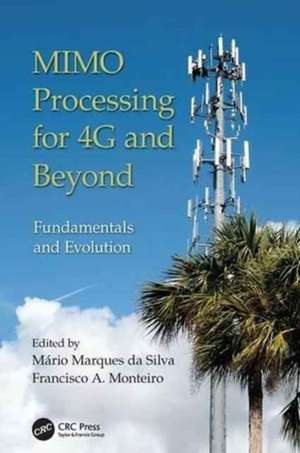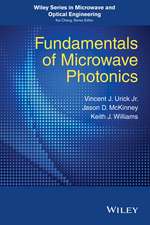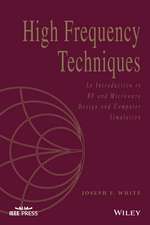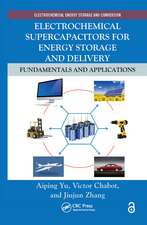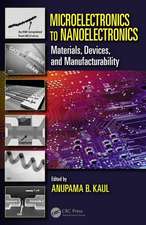MIMO Processing for 4G and Beyond: Fundamentals and Evolution
Editat de Mário Marques da Silva, Francisco A. Monteiroen Limba Engleză Paperback – 16 noi 2016
The book brings together contributing authors from first-class institutions who have been working in international research and development (R&D) projects and are highly cited in the MIMO field. These experts examine ongoing R&D activities in the field of MIMO systems and its associated signal processing that is expected to be employed in 4G and 5G systems.
- Covers the various wireless communication standards that make use of MIMO systems
- Explains the receiver processing associated with MIMO signal detection (including the case of massive MIMO systems) and presents the optimal precoding techniques
- Considers optimized MIMO schemes and processing for block transmission techniques, for orthogonal frequency division multiplexing (OFDM) transmission techniques, and for single carrier-frequency domain equalization
- Examines MIMO processing and optimization for wideband code division multiple access (WCDMA)
- Describes the ultra-wideband (UWB) transmission technique and the corresponding MIMO processing and optimizations
- Explains physical layer network coding techniques
The book summarizes the most important enhancements related to the processing of MIMO systems for 4G systems, including its evolution and future trends. It also supplies a performance analysis of the various combinations of MIMO schemes for 4G systems to help you select the combination best suited for your particular needs.
| Toate formatele și edițiile | Preț | Express |
|---|---|---|
| Paperback (1) | 318.90 lei 6-8 săpt. | |
| CRC Press – 16 noi 2016 | 318.90 lei 6-8 săpt. | |
| Hardback (1) | 744.12 lei 6-8 săpt. | |
| CRC Press – 3 iun 2014 | 744.12 lei 6-8 săpt. |
Preț: 318.90 lei
Preț vechi: 364.17 lei
-12% Nou
Puncte Express: 478
Preț estimativ în valută:
61.03€ • 63.63$ • 50.72£
61.03€ • 63.63$ • 50.72£
Carte tipărită la comandă
Livrare economică 21 martie-04 aprilie
Preluare comenzi: 021 569.72.76
Specificații
ISBN-13: 9781138033979
ISBN-10: 1138033979
Pagini: 552
Ilustrații: 231
Dimensiuni: 156 x 234 mm
Greutate: 0.45 kg
Ediția:1
Editura: CRC Press
Colecția CRC Press
ISBN-10: 1138033979
Pagini: 552
Ilustrații: 231
Dimensiuni: 156 x 234 mm
Greutate: 0.45 kg
Ediția:1
Editura: CRC Press
Colecția CRC Press
Public țintă
Academic and Professional Practice & DevelopmentCuprins
MIMO Techniques and Applications. MIMO Detection Methods. Precoding for MIMO. MIMO Optimized for OFDM. MIMO Optimized for Single-Carrier Frequency-Domain Equalization. MIMO Optimized for W-CDMA. Ultrawideband Systems and MIMO. Frequency-Domain Packet Combining Techniques for UWB. Link and System Level Simulation for MIMO. Massive MIMO and Its Detection. MIMO Two-Way Relay Channel with Superposition Coding. Physical-Layer Network Coding with Multiple-Antenna Relays.
Notă biografică
Mário Marques da Silva is an associate professor at the Universidade Autónoma de Lisboa, and a researcher at Instituto de Telecomunicações in Lisbon, Portugal. He received his BSc in electrical engineering in 1992, and MSc and PhD in telecommunications/electrical engineering in 1999 and 2005, respectively, both from Instituto Superior Técnico, University of Lisbon.
Between 2005 and 2008, he was with NATO Air Command Control & Management Agency (NACMA) in Brussels (Belgium), where he managed the deployable communications of the new Air Command and Control System Program. He has been involved in several telecommunications projects. His research interests include networking and mobile communications, namely, block transmission techniques (OFDM, SC-FDE), interference cancellation, space–time coding, MIMO systems, smart and adaptive antennas, channel estimation, software defined radio, IP technologies, and network security. Mário Marques da Silva is also a Cisco certified CCNA instructor.
He has authored books such as Multimedia Communications and Networking (CRC Press), Transmission Techniques for Emergent Multicast and Broadcast Systems (CRC Press), and Transmission Techniques for 4G Systems (CRC Press), as well as authored several dozens of journal and conference papers. He is a member of IEEE and AFCEA, as well as reviewer for a number of international scientific IEEE journals and conferences. Finally, he has chaired many conference sessions and has been serving in the organizing committee of relevant EURASIP and IEEE conferences.
Francisco A. Monteiro is an assistant professor at ISCTE—University Institute of Lisbon and a researcher at Instituto de Telecomunicações in Lisbon, Portugal. In the past, he has been a teaching assistant at the Department of Electrical and Computer Engineering at Instituto Superior Técnico, University of Lisbon. He obtained his PhD in engineering from the University of Cambridge, United Kingdom, in 2012, and had previously received both the Licenciatura degree and an MSc in electrical and computer engineering from Instituto Superior Técnico, University of Lisbon, in 1999 and 2003, respectively. His research has always been focused on signal processing for wireless communications. He acts as a frequent reviewer for a number of IEEE journals and conferences, and has been serving in the organizing committee of relevant EURASIP and IEEE conferences.
In 2008, Dr. Monteiro was a visiting researcher at the Department of Electrical and Computer Engineering of the University of Toronto for four months, with scholarships from the Royal Academy of Engineering, the Calouste Gulbenkian Foundation and the Cambridge Philosophical Society. At Cambridge, he was a member of Fitzwilliam College (where he received a College Senior Scholarship in 2007/2008), and carried out his research in the Digital Technology Group at the Computer Laboratory, while being affiliated with the Department of Engineering. He received the Best Paper Award (Conference Prize) at the European Conference on Wireless Technology 2007 in Munich, Germany. He was also awarded the Young Engineer Best Paper Award at the European Conference on Wireless Technology 2004, in Amsterdam, the Netherlands. His MSc thesis was awarded 3rd place at the Innovation Young Engineer Competition presented by the Portuguese Engineers Institution in 2002.
Dr. Monteiro is a member of several societies of the IEEE, a life member of Fitzwilliam College, a Fellow of the Cambridge Philosophical Society, a junior member of the Isaac Newton Institute for Mathematical Sciences, and a life member of student societies for the promotion of science and technology (namely, the Trinity Mathematical Society, and the Cambridge University Scientific Society).
Between 2005 and 2008, he was with NATO Air Command Control & Management Agency (NACMA) in Brussels (Belgium), where he managed the deployable communications of the new Air Command and Control System Program. He has been involved in several telecommunications projects. His research interests include networking and mobile communications, namely, block transmission techniques (OFDM, SC-FDE), interference cancellation, space–time coding, MIMO systems, smart and adaptive antennas, channel estimation, software defined radio, IP technologies, and network security. Mário Marques da Silva is also a Cisco certified CCNA instructor.
He has authored books such as Multimedia Communications and Networking (CRC Press), Transmission Techniques for Emergent Multicast and Broadcast Systems (CRC Press), and Transmission Techniques for 4G Systems (CRC Press), as well as authored several dozens of journal and conference papers. He is a member of IEEE and AFCEA, as well as reviewer for a number of international scientific IEEE journals and conferences. Finally, he has chaired many conference sessions and has been serving in the organizing committee of relevant EURASIP and IEEE conferences.
Francisco A. Monteiro is an assistant professor at ISCTE—University Institute of Lisbon and a researcher at Instituto de Telecomunicações in Lisbon, Portugal. In the past, he has been a teaching assistant at the Department of Electrical and Computer Engineering at Instituto Superior Técnico, University of Lisbon. He obtained his PhD in engineering from the University of Cambridge, United Kingdom, in 2012, and had previously received both the Licenciatura degree and an MSc in electrical and computer engineering from Instituto Superior Técnico, University of Lisbon, in 1999 and 2003, respectively. His research has always been focused on signal processing for wireless communications. He acts as a frequent reviewer for a number of IEEE journals and conferences, and has been serving in the organizing committee of relevant EURASIP and IEEE conferences.
In 2008, Dr. Monteiro was a visiting researcher at the Department of Electrical and Computer Engineering of the University of Toronto for four months, with scholarships from the Royal Academy of Engineering, the Calouste Gulbenkian Foundation and the Cambridge Philosophical Society. At Cambridge, he was a member of Fitzwilliam College (where he received a College Senior Scholarship in 2007/2008), and carried out his research in the Digital Technology Group at the Computer Laboratory, while being affiliated with the Department of Engineering. He received the Best Paper Award (Conference Prize) at the European Conference on Wireless Technology 2007 in Munich, Germany. He was also awarded the Young Engineer Best Paper Award at the European Conference on Wireless Technology 2004, in Amsterdam, the Netherlands. His MSc thesis was awarded 3rd place at the Innovation Young Engineer Competition presented by the Portuguese Engineers Institution in 2002.
Dr. Monteiro is a member of several societies of the IEEE, a life member of Fitzwilliam College, a Fellow of the Cambridge Philosophical Society, a junior member of the Isaac Newton Institute for Mathematical Sciences, and a life member of student societies for the promotion of science and technology (namely, the Trinity Mathematical Society, and the Cambridge University Scientific Society).
Descriere
This book offers a cutting-edge look at multiple-input multiple-output (MIMO) signal processing, namely its detection and precoding. It examines its combination with OFDM, UWB, and CDMA, along with the impact of these combinations at the system level. Massive MIMO and network coding at the physical layer are very recent topics which are also addressed. The book presents the work of contributing authors from first-class institutions who are highly cited in the MIMO field. These experts examine ongoing R&D activities in the field of MIMO systems and its associated signal processing that is expected to be employed in 4G and 5G systems.
